Best Basement Finishing Materials for Pittsburgh Homes (And Why We Use Them)
April 9th, 2024
7 min read
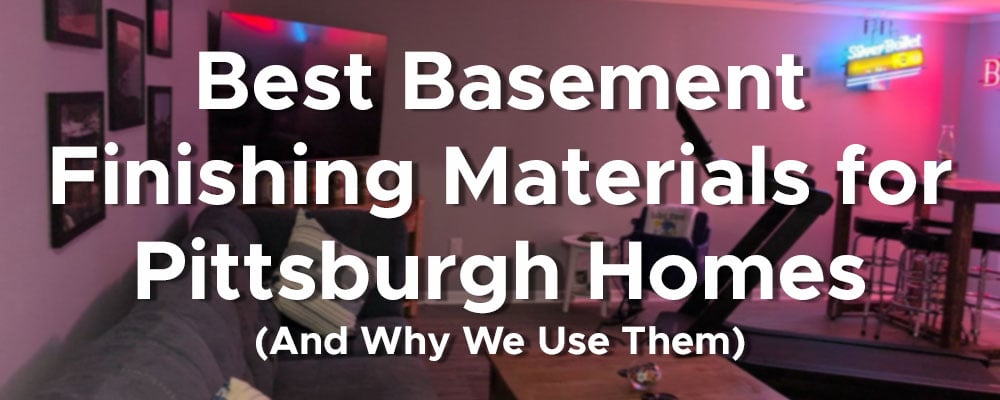
If you’ve ever walked into a finished basement and caught that musty, damp smell, you already know the problem: mold or mildew caused by moisture issues. Pittsburgh receives approximately 38 inches of rainfall annually, and most basements are fully below grade, making moisture a common challenge for homeowners.
Humidity, condensation, and even normal soil pressure can produce moisture that can lead to mold, warping, and costly repairs when traditional materials like drywall, carpet, or wood are used below ground.
At Energy Swing, we’ve been helping homeowners in Western Pennsylvania finish their basements the right way, with materials specifically engineered to resist water, mold, and long-term damage.
We are the region’s exclusive dealer for the Total Basement Finishing (TBF) System. We wanted to offer this product to Pittsburgh-area homeowners because we believe this system is a better solution to basement finishing than the traditional route. While we strongly support this system, we will try to be unbiased when comparing it to other materials.
In this article, you’ll learn exactly what materials Energy Swing uses in our system and why they’re the smarter, safer choice for finishing a basement in Pittsburgh’s climate.
Key Takeaways: What You’ll Learn
- Why traditional materials like drywall, carpet, and wood often fail in Pittsburgh basements
- What makes the Total Basement Finishing (TBF) system moisture-resistant and mold-proof
- A breakdown of each material we use—walls, flooring, ceiling tiles, trim—and why they matter
- How the TBF system compares in cost, maintenance, and long-term value
- Smart questions to ask any basement contractor before hiring them
Why Do Most Traditional Materials Fail in Pittsburgh Basements?
Pittsburgh basements are typically completely below ground, making them more susceptible to moisture, humidity, and water infiltration, even without a leak. Warm, humid summer air hitting cold foundation walls can create condensation, and that alone can fuel mold growth over time.
Standard materials like wood, drywall, and carpet can trap moisture instead of allowing it to escape.
Common risks of traditional materials:
- Musty mildew odors that linger and worsen air quality
- Hidden mold growth behind finished drywall
- Warping, buckling, or delamination of wood/laminate flooring
- Long-term exposure could pose health hazards
Over 60% of U.S. homes with basements experience some sort of water penetration, according to Ark Basement Services. And over a basement's lifespan, approximately 98% of them will have some form of water damage.
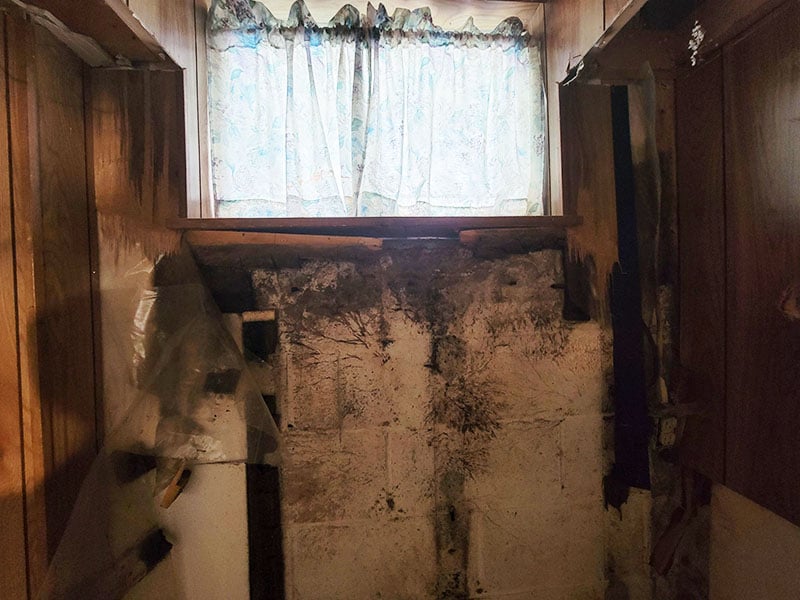
Mold that was behind drywall in a Monroeville basement.
What Is the Total Basement Finishing (TBF) System?
If you're researching basement finishing options, you've likely come across a wide range of materials, from traditional drywall and carpet to more specialized basement systems. But not all solutions are built for the moisture challenges that come with below-ground spaces, especially in Pittsburgh.
That’s where a Total Basement Finishing (TBF) system comes in.
Instead of mixing and matching materials that might not hold up in a damp environment, this system is designed as a fully integrated approach: every component is engineered specifically for use in basements, where moisture, humidity, and condensation are common.
At a high level, a TBF system typically includes:
- Wall panels with built-in insulation and mold resistance
- Raised flooring that allows moisture to escape and prevents cold floors
- Ceiling tiles that resist sagging or staining from humidity
- Waterproof trim and baseboards that don’t swell or warp
This matters because each piece works together to protect your space, reduce maintenance, and extend the life of your investment. Whether you're finishing your basement for more living space, a home gym, or a playroom, using materials made for the environment below ground is key to avoiding mold issues, costly repairs, and frustration later on.
Pro Tip: If you’re comparing multiple contractors or systems, ask whether their materials are rated for moisture or include warranties for basement use. Many standard building materials aren’t — and that’s where problems often start.
At Energy Swing, we offer the nationally backed TBF system as the exclusive dealer in Western Pennsylvania. But even if you don’t choose us, knowing what to look for in basement materials can save you thousands in the long run.
What Is the Best Wall Material for Pittsburgh Basements?
The EverLast™ Wall Panel System is designed from the ground up for basement performance. Here’s what makes it different and the best option for basements:
Composition:
- Radiant vapor barrier on the back
- 2.5 inches of closed-cell, graphite-infused foam insulation (R-15 insulation value)
- 0.5-inch cement board faced with either a vinyl or paintable finish
Benefits:
- 100% inorganic, water- and mold-resistant
- Easy to clean and impact-resistant
- Works with French drains and sump systems to channel moisture away
- Helps keep basements warmer in winter for more comfortable use year-round
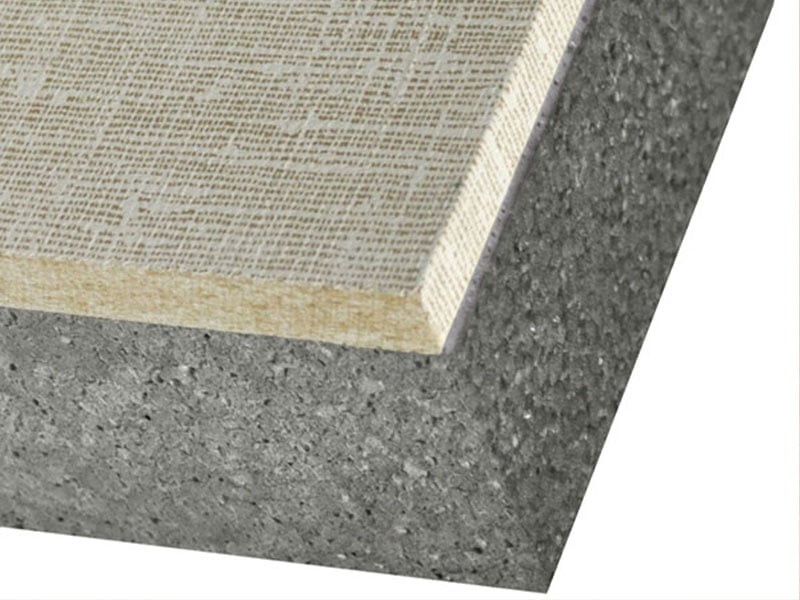
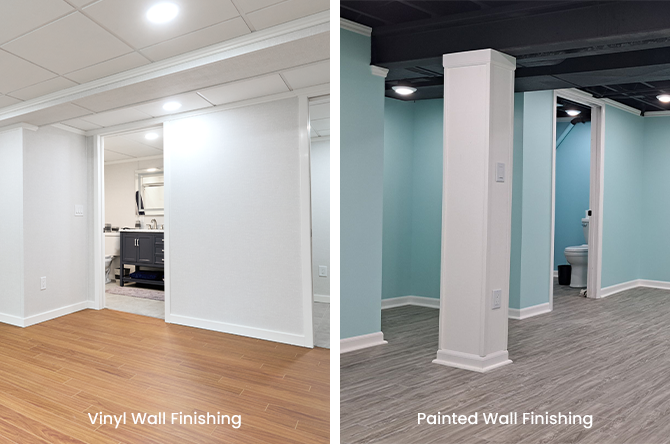
What Basement Flooring Works Best in Damp Pittsburgh Homes?
The ThermalDry® Elite Flooring is a warm, durable, and water-smart solution that is made from a raised vinyl plank system and is specifically designed for damp environments.
| Traditional Flooring | ThermalDry® Elite |
|---|---|
| Carpet traps moisture and grows mold | Elevated peg design allows airflow |
| Laminate warps and delaminates easily | Water drains under the floor to reach drains |
| LVP lays flat and traps water | Modular and easy to replace |
| Cold to the touch on from concrete floor | 7–12°F warmer year-round |
Although the ThermalDry Elite flooring offers unique benefits against water, some homeowners still choose carpet to finish their basement because it can give you a more customized look. Not to mention plush carpet can feel pretty nice on your feet.
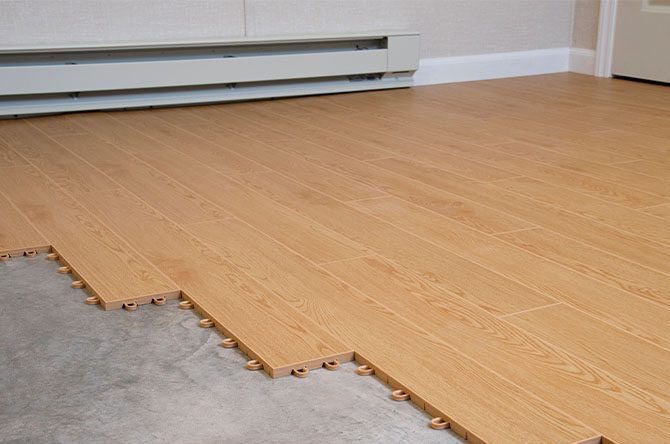
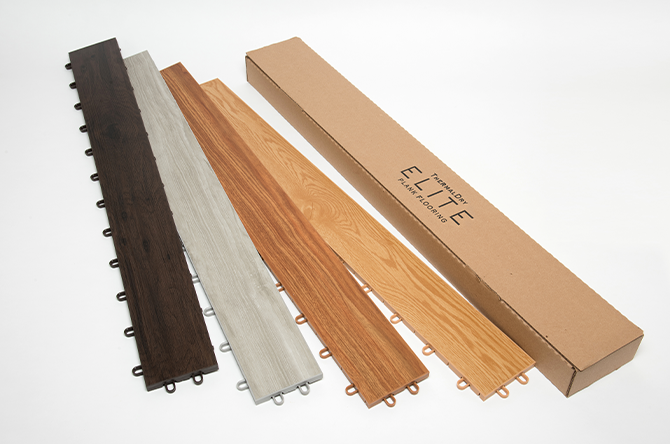
Are Basement Ceiling Materials Moisture-Resistant in Pittsburgh Homes?
Yes! Even the ceiling option we offer is moisture-resistant. Our mineral-based drop ceiling tiles resist sagging and mold, unlike traditional paper- or fiberglass-based options.
Benefits:
- Hold up to Pittsburgh humidity without warping or staining
- Allow quick access to plumbing, electrical, and ductwork without costly repairs
Drop ceilings are often preferred in basements due to easy access to systems; however, some homeowners still opt for drywall for a more finished appearance, despite the potential for water damage in the event of leaks.
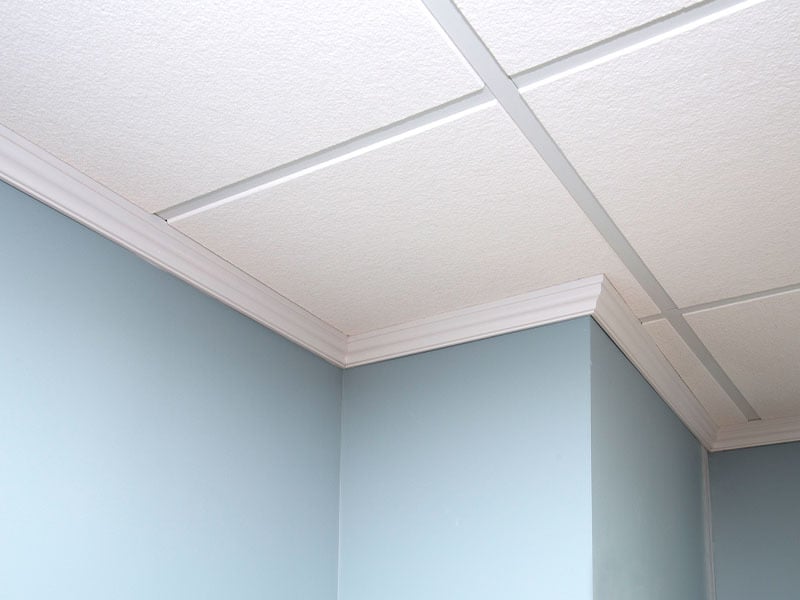
No matter the options, keep in mind that to follow code, ceiling height must have at least 7 feet in clearance, according to the County of Allegheny. If your basement ceiling falls below this, an exposed, painted finish is a great option.
Is PVC Trim and Solid-Core Doors a Good Choice for Basements?
We use PVC trim and baseboards that won’t warp or swell, unlike MDF or pine. These materials:
- They are easy to clean
- Never needs repainting or replacement after water exposure
- Maintain their appearance for years
As for doors, we typically use solid-core options. While they aren’t fully waterproof, they’re easy to replace and not part of the core waterproofing system.
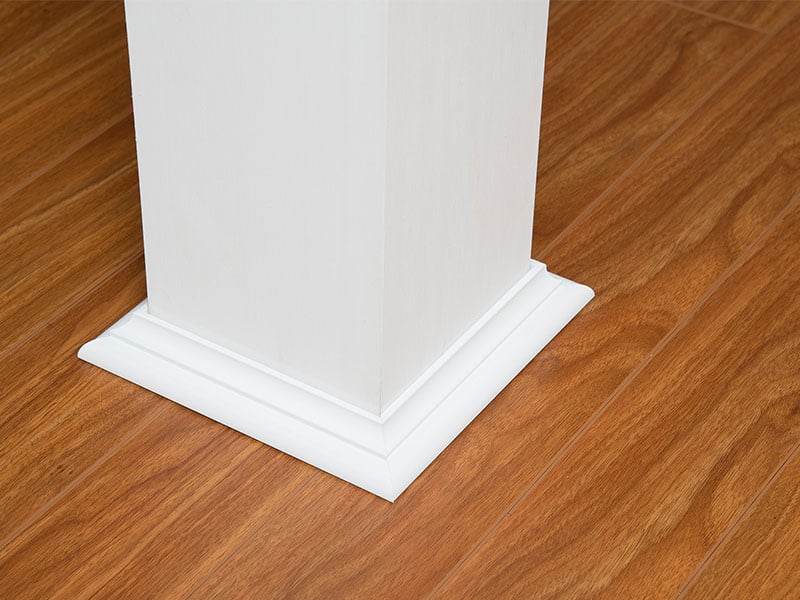
How Do These Materials Impact Cost and Long-Term Value?
The TBF system does cost more upfront than traditional drywall and carpet. But it offers better long-term savings and peace of mind:
- No costly mold or water damage repairs
- Minimal upkeep (no repainting or re-caulking)
- Transferable warranties that can boost release value
Warranties:
- 50 years on wall panels
- 15 years on flooring
- Lifetime workmanship warranty from Energy Swing (for as long as you live in your home)
| Finish Type | Description | Estimated Cost/Sq Ft |
|---|---|---|
| DIY/Budget | Paint, paneling, basic electrical | $30–$50 |
| Mid-Range | Drywall, MDF trim, standard fixtures | $80–$100 |
| High-End | Premium materials, custom layouts, plumbing | $115+ |
Estimated Cost and Monthly Payments for Pittsburgh Basement Finishing Projects (Based on Square Footage)
| Size of Basement (sq ft) | Estimated Cost | Monthly Payment (12 years) |
|---|---|---|
| 300 - 400 sq ft | $36,500 - $49,000 | $415 - $557 |
| 400 - 500 sq ft | $48,000 - $60,500 | $546 - $688 |
| 500 - 600 sq ft | $59,500 - $71,500 | $677 - $813 |
| 600 - 700 sq ft | $70,500 - $83,000 | $802 - $944 |
| 700 - 800 sq ft | $82,000 - $94,500 | $933 - $1,075 |
| 800 - 900 sq ft | $93,500 - $106,000 | $1,064 - $1,206 |
| 900+ sq ft | $103,500+ | $1,172+ |
Size is one of the biggest factors that affect basement finishing price. Read our full guide on How Much Basement Size Impacts Finishing Cost in Pittsburgh.

How Does Energy Swing Compare to Other Basement Finishing Options?
Many local contractors still use drywall and carpet. Even other finishing systems (like Owens Corning’s fiberglass-and-fabric approach) can have problems with durability in damp conditions because of the non-water resistant materials.
At Energy Swing, we offer:
- A locally owned team of certified employee installers
- Custom design planning to meet your family’s goals
- A one-stop, turnkey experience without juggling subcontractors
| Feature | Traditional Contractors | Energy Swing’s TBF System |
|---|---|---|
| Materials | Drywall, carpet, wood | Inorganic, mold-resistant |
| Subcontractors | Often outsourced | Trained, in-house employee team |
| Moisture durability | High risk of damage | Built to withstand water |
| Showroom available? | Rare | Yes – Monroeville Design Center |
| Warranty | Rarely offered | Manufacturers + Energy Swing’s Triple Lifetime Warranty |
What Questions Should I Ask Before Choosing a Basement Contractor?
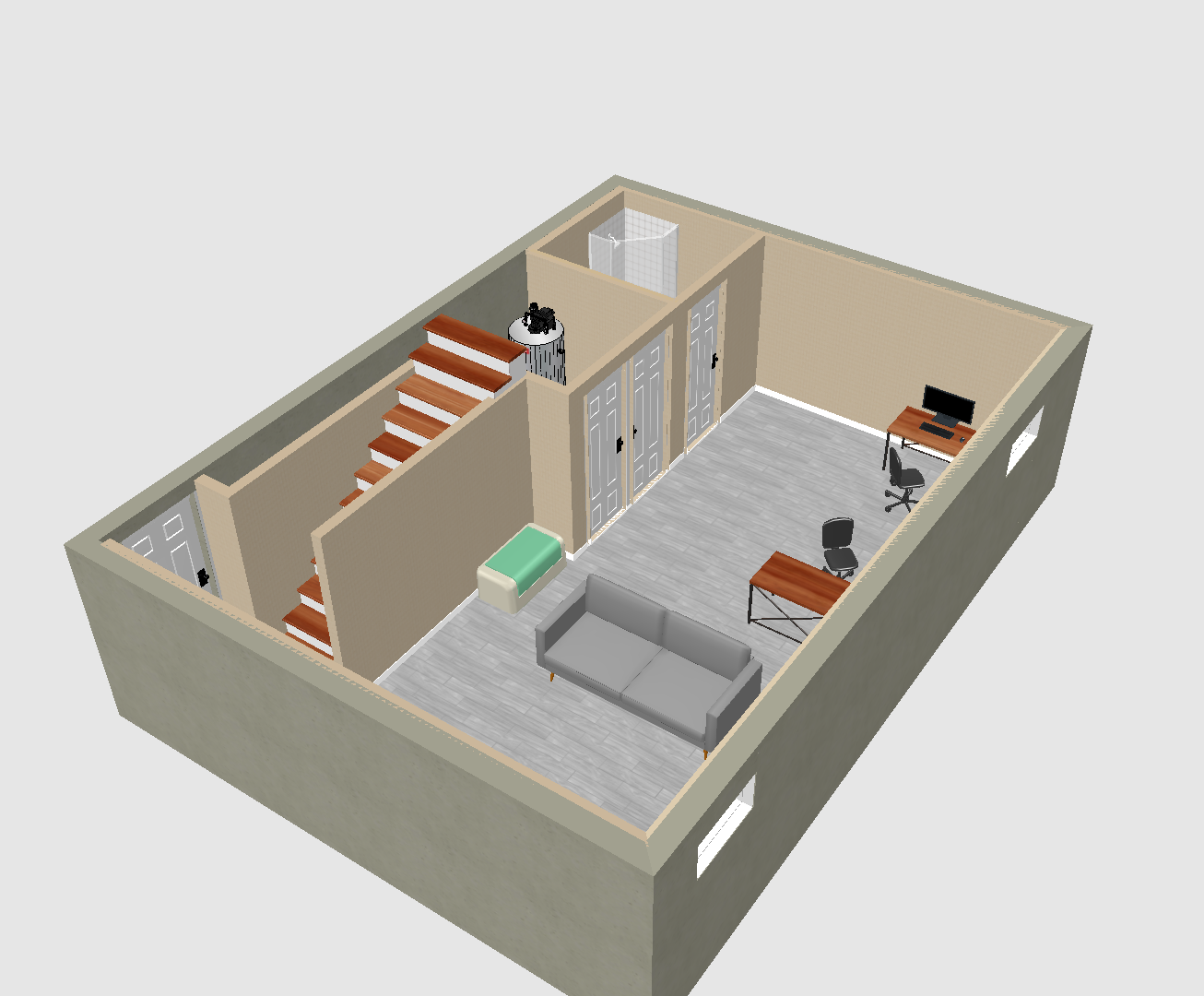
Here are a few smart questions to ask before signing on with anyone:
- How long have you been finishing basements?
- Do you use mold-resistant, inorganic materials?
- Can I visit a showroom or see examples of your work?
- Will you provide a virtual 3D design layout before we begin?
- Do you use subcontractors, or is your team in-house?
These questions help ensure you’re choosing a contractor who prioritizes durability, safety, and long-term value.
Why These Materials Matter for Pittsburgh Homes
After years of dealing with moisture, mold, and musty odors, many Pittsburgh homeowners have been left frustrated by basement finishing systems that just don’t hold up below ground. Even with the best intentions, traditional materials like drywall, carpet, and wood often lead to expensive repairs and health concerns.
Now that you understand exactly what goes into Energy Swing’s Total Basement Finishing System, from mold-resistant wall panels to moisture-smart flooring and trim, you’re equipped to make a more informed decision about how to protect your investment and enjoy your space long-term.
If you’re ready to explore a basement system that’s actually built for Pittsburgh homes, your next step is to schedule a free in-home consultation. We’ll show you the materials in person, answer your questions, and help you plan a space that works for your lifestyle without the worry.

Pittsburgh Homeowner FAQs About Basement Finishing
1: Is it safe to finish a basement in Pittsburgh given all the rain and moisture?
Yes, but only if the right materials are used. Many traditional materials like drywall and carpet absorb moisture and can lead to mold issues. That’s why we use inorganic, mold-resistant components in our Total Basement Finishing (TBF) system—ideal for Pittsburgh’s wet climate and older, below-grade basements.
2: My basement only has occasional dampness, is TBF still worth it?
Even minor moisture can lead to big problems over time. Basements in neighborhoods like Mt. Lebanon, Greenfield, and Bethel Park often have seasonal dampness. The TBF system is designed to handle those fluctuations without warping, staining, or growing mold.
3: How does basement finishing affect home value in Pittsburgh?
A finished basement done right can significantly increase livable square footage—and resale value. In areas like Shadyside, Squirrel Hill, and Upper St. Clair, buyers often expect usable basement space. Moisture-proof systems like TBF also reduce future repair costs and improve indoor air quality, both of which appeal to buyers.
4: Do I need waterproofing before finishing my Pittsburgh basement?
If your basement has standing water, active leaks, or signs of structural damage, waterproofing comes first. Many homes in the East End, Mon Valley, and South Hills benefit from a sump pump or French drain system. We’ll assess your basement during your consultation and recommend the right prep steps before finishing begins.
5: Can I see the materials in person before deciding?
Absolutely. You can visit our Monroeville Design Center to touch and see every component we use—wall panels, flooring, trim, and ceiling system —and talk through your options with a local basement finishing expert.
